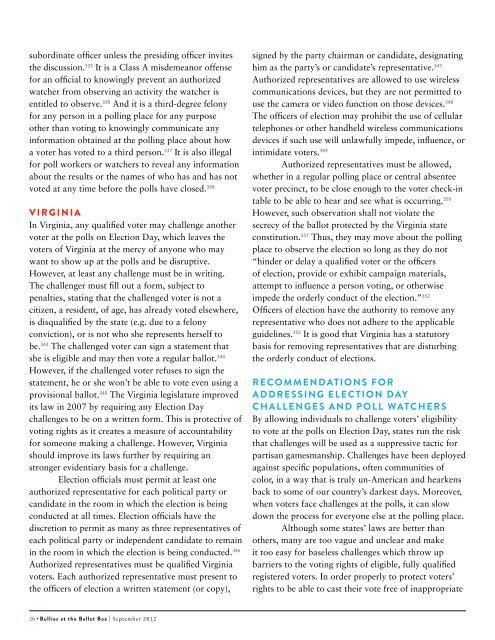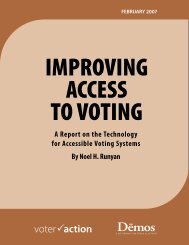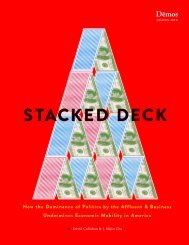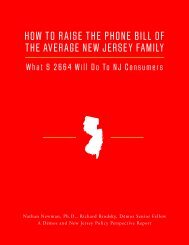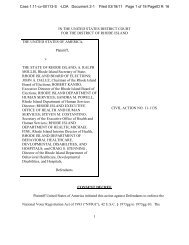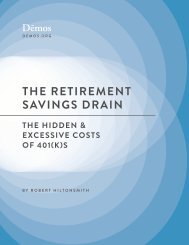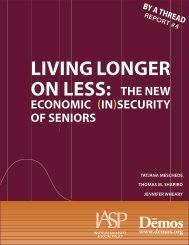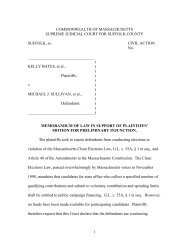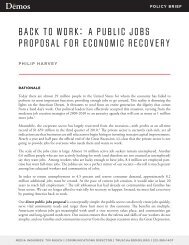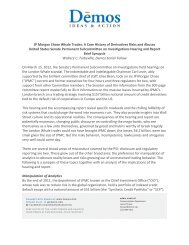Bullies at the Ballot Box - Demos
Bullies at the Ballot Box - Demos
Bullies at the Ballot Box - Demos
Create successful ePaper yourself
Turn your PDF publications into a flip-book with our unique Google optimized e-Paper software.
subordin<strong>at</strong>e officer unless <strong>the</strong> presiding officer invites<br />
<strong>the</strong> discussion. 335 It is a Class A misdemeanor offense<br />
for an official to knowingly prevent an authorized<br />
w<strong>at</strong>cher from observing an activity <strong>the</strong> w<strong>at</strong>cher is<br />
entitled to observe. 336 And it is a third-degree felony<br />
for any person in a polling place for any purpose<br />
o<strong>the</strong>r than voting to knowingly communic<strong>at</strong>e any<br />
inform<strong>at</strong>ion obtained <strong>at</strong> <strong>the</strong> polling place about how<br />
a voter has voted to a third person. 337 It is also illegal<br />
for poll workers or w<strong>at</strong>chers to reveal any inform<strong>at</strong>ion<br />
about <strong>the</strong> results or <strong>the</strong> names of who has and has not<br />
voted <strong>at</strong> any time before <strong>the</strong> polls have closed. 338<br />
virginia<br />
In Virginia, any qualified voter may challenge ano<strong>the</strong>r<br />
voter <strong>at</strong> <strong>the</strong> polls on Election Day, which leaves <strong>the</strong><br />
voters of Virginia <strong>at</strong> <strong>the</strong> mercy of anyone who may<br />
want to show up <strong>at</strong> <strong>the</strong> polls and be disruptive.<br />
However, <strong>at</strong> least any challenge must be in writing.<br />
The challenger must fill out a form, subject to<br />
penalties, st<strong>at</strong>ing th<strong>at</strong> <strong>the</strong> challenged voter is not a<br />
citizen, a resident, of age, has already voted elsewhere,<br />
is disqualified by <strong>the</strong> st<strong>at</strong>e (e.g. due to a felony<br />
conviction), or is not who she represents herself to<br />
be. 343 The challenged voter can sign a st<strong>at</strong>ement th<strong>at</strong><br />
she is eligible and may <strong>the</strong>n vote a regular ballot. 344<br />
However, if <strong>the</strong> challenged voter refuses to sign <strong>the</strong><br />
st<strong>at</strong>ement, he or she won’t be able to vote even using a<br />
provisional ballot. 345 The Virginia legisl<strong>at</strong>ure improved<br />
its law in 2007 by requiring any Election Day<br />
challenges to be on a written form. This is protective of<br />
voting rights as it cre<strong>at</strong>es a measure of accountability<br />
for someone making a challenge. However, Virginia<br />
should improve its laws fur<strong>the</strong>r by requiring an<br />
stronger evidentiary basis for a challenge.<br />
Election officials must permit <strong>at</strong> least one<br />
authorized represent<strong>at</strong>ive for each political party or<br />
candid<strong>at</strong>e in <strong>the</strong> room in which <strong>the</strong> election is being<br />
conducted <strong>at</strong> all times. Election officials have <strong>the</strong><br />
discretion to permit as many as three represent<strong>at</strong>ives of<br />
each political party or independent candid<strong>at</strong>e to remain<br />
in <strong>the</strong> room in which <strong>the</strong> election is being conducted. 346<br />
Authorized represent<strong>at</strong>ives must be qualified Virginia<br />
voters. Each authorized represent<strong>at</strong>ive must present to<br />
<strong>the</strong> officers of election a written st<strong>at</strong>ement (or copy),<br />
26 • <strong>Bullies</strong> <strong>at</strong> <strong>the</strong> <strong>Ballot</strong> <strong>Box</strong> | September 2012<br />
signed by <strong>the</strong> party chairman or candid<strong>at</strong>e, design<strong>at</strong>ing<br />
him as <strong>the</strong> party’s or candid<strong>at</strong>e’s represent<strong>at</strong>ive. 347<br />
Authorized represent<strong>at</strong>ives are allowed to use wireless<br />
communic<strong>at</strong>ions devices, but <strong>the</strong>y are not permitted to<br />
use <strong>the</strong> camera or video function on those devices. 348<br />
The officers of election may prohibit <strong>the</strong> use of cellular<br />
telephones or o<strong>the</strong>r handheld wireless communic<strong>at</strong>ions<br />
devices if such use will unlawfully impede, influence, or<br />
intimid<strong>at</strong>e voters. 349<br />
Authorized represent<strong>at</strong>ives must be allowed,<br />
whe<strong>the</strong>r in a regular polling place or central absentee<br />
voter precinct, to be close enough to <strong>the</strong> voter check-in<br />
table to be able to hear and see wh<strong>at</strong> is occurring. 350<br />
However, such observ<strong>at</strong>ion shall not viol<strong>at</strong>e <strong>the</strong><br />
secrecy of <strong>the</strong> ballot protected by <strong>the</strong> Virginia st<strong>at</strong>e<br />
constitution. 351 Thus, <strong>the</strong>y may move about <strong>the</strong> polling<br />
place to observe <strong>the</strong> election so long as <strong>the</strong>y do not<br />
“hinder or delay a qualified voter or <strong>the</strong> officers<br />
of election, provide or exhibit campaign m<strong>at</strong>erials,<br />
<strong>at</strong>tempt to influence a person voting, or o<strong>the</strong>rwise<br />
impede <strong>the</strong> orderly conduct of <strong>the</strong> election.” 352<br />
Officers of election have <strong>the</strong> authority to remove any<br />
represent<strong>at</strong>ive who does not adhere to <strong>the</strong> applicable<br />
guidelines. 353 It is good th<strong>at</strong> Virginia has a st<strong>at</strong>utory<br />
basis for removing represent<strong>at</strong>ives th<strong>at</strong> are disturbing<br />
<strong>the</strong> orderly conduct of elections.<br />
reCommend<strong>at</strong>IonS For<br />
addreSSIng eleCtIon day<br />
ChallengeS and Poll W<strong>at</strong>CherS<br />
By allowing individuals to challenge voters’ eligibility<br />
to vote <strong>at</strong> <strong>the</strong> polls on Election Day, st<strong>at</strong>es run <strong>the</strong> risk<br />
th<strong>at</strong> challenges will be used as a suppressive tactic for<br />
partisan gamesmanship. Challenges have been deployed<br />
against specific popul<strong>at</strong>ions, often communities of<br />
color, in a way th<strong>at</strong> is truly un-American and hearkens<br />
back to some of our country’s darkest days. Moreover,<br />
when voters face challenges <strong>at</strong> <strong>the</strong> polls, it can slow<br />
down <strong>the</strong> process for everyone else <strong>at</strong> <strong>the</strong> polling place.<br />
Although some st<strong>at</strong>es’ laws are better than<br />
o<strong>the</strong>rs, many are too vague and unclear and make<br />
it too easy for baseless challenges which throw up<br />
barriers to <strong>the</strong> voting rights of eligible, fully qualified<br />
registered voters. In order properly to protect voters’<br />
rights to be able to cast <strong>the</strong>ir vote free of inappropri<strong>at</strong>e


